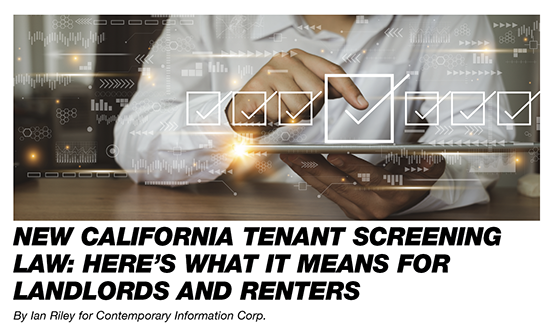New California Tenant Screening Law: Here’s What It Means for Landlords and Renters

By Ian Riley for Contemporary Information Corp.
A new year comes with a multitude of new things, and the rental housing industry is no exception. With the passing of California’s Assembly Bill No. 2559, effective January 1st, 2023, an existing consumer report ordered by a landlord on a prospective tenant can now be redefined as a reusable tenant screening report. So, what exactly does this mean?
Simply put, an applicant’s report can be reused for the application process within 30 days of purchase. The furnished report must comply with all state and federal laws pertaining to the use and disclosure of information used in the tenant screening process and must include all specified information as outlined, including, but not limited to: full legal name, verification of employment/income, previous addresses and last known address, the results of a housing record history check (consistent to applicable law), any records that may exist of the applicant’s criminal history, etc.
The benefits of reusable tenant screening reports are not one-sided.
- First and foremost, the acceptance of a reusable tenant screening report by the landlord is entirely optional, and the landlord must be opted in if proceeding with a reusable tenant screening report. Opting in is not a requirement for the tenant screening process.
- Use of a reusable tenant screening report expedites the tenant screening and application process if the applicant is applying to multiple properties and mitigates the expense of the tenant paying multiple fees per property applied for.
- While the initial cost of obtaining the report from a consumer reporting agency is at the request and expense of the applicant, the option for reuse comes at no additional cost to the landlord or applicant, and the landlord is prohibited from charging an application fee to access or view the report.
- The 30-day reuse period allows for the most up-to-date and current information on the applicant if the timeframe is exceeded while the applicant is still applying to properties. This also gives agency and incentive to the applicant to complete the process in a timely manner.
- Reusable tenant screening reports must still contain all prescribed information required for the application, the same as any consumer report ordered for the purposes of renting a property.
- For convenience, reusable tenant screening reports can be ordered and provided through third-party screening providers, which regularly engages in the business of providing a reusable tenant screening report.
While the list of pros is substantial, existing landlords considering proceeding with reusable tenant screening reports may be wondering – “Are there any cons I should be aware of before opting in and accepting a report this way? And what should I be prepared for?”
Like any bill newly signed into law, any unintended consequences associated with Assembly Bill 2559 remain to be seen. For instance, one could ascertain that a byproduct of prohibiting the charge of additional fees by a landlord who traditionally imposes an application/processing fee to cover any additional expenses other than the cost of obtaining the report means forfeiting the landlord’s autonomy to impose such a fee, and that additional cash flow as well. Landlords who opt in will need to amend their screening process to remove said fees.
Section F of the bill also asserts that if an ordinance, resolution, regulation, administrative action, initiative, or other policy adopted by a city, county, or city and county conflicts with this section, the policy that provides greater protections to applicants shall apply. In some cities and counties, these local laws can prohibit rental owners from considering their applicant’s criminal report, even if it’s on a reusable report. Landlords will also have to accept different formats of the report, as not all screening companies were created the same – one might source their data differently than another with different accuracy rates, primarily use FICO instead of VantageScore in credit reporting and vice versa, etc.
As more landlords and property managers accept reusable tenant screening reports, we’ll be able to see more definitively how and if that changes the leasing process in California. While the provisions in Assembly Bill 2559 are optional now, it’s important to keep your eyes peeled for legislation that could aim to make it required.
Ian Riley is the Content Strategist at Contemporary Information Corp. (CIC). When he’s not working, Ian can usually be found recording and producing music, playing video games, spending time with his daughter, and continuing his never-ending search for the strongest coffee in town. This article has been contributed by CIC. CIC and ApplyConnect are the preferred tenant screening service providers of the Apartment Association of Greater Los Angeles. For more information, go to https://aagla.org/cic-apply-connect.








